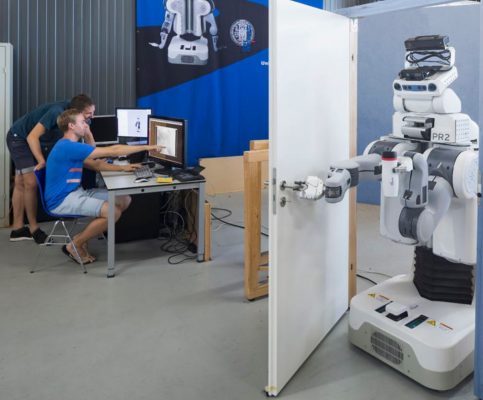The University of Freiburg is boosting artificial intelligence research in its Faculty of Engineering with two new Assistant Professorships.
How can computers learn to generalize the data contained in a massive dataset and find solutions for complex problems? How can it do this on its own? Two new Assistant Professorships – 1. Robot Learning 2. Representation Learning – will focus on these questions.
The two Assistant Professorships are the result of a successful application in “Artificial Intelligence Baden-Württemberg,” which the state Ministry of Science, Research and the Arts administers.
Baden-Württemberg is a state in southwest Germany that borders Switzerland and France. Its capital is Stuttgart. Mercedes-Benz and Porsche have their headquarters there.
The state government of Baden-Württemberg has awarded €1.2 million in sponsorship for the professorships over the next four years.
Artificial intelligence
Artificial intelligence or AI includes software technologies that make robots or computers think like human beings. It also makes them behave like humans.
Some AI engineers say that it is only artificial intelligence if it can perform at least as well as a human. Performance, in this context, refers to human computational speed, accuracy, and capacity.
The importance of AI research
Science minister Theresia Bauer said:
“Whether it is data evaluation, autonomous driving or smart homes, Industry 4.0 or in academia: It is of vital importance for our society, academia, and economy to research the development artificial intelligence methods and their applications.”
Prof. Dr. Gunther Neuhaus, Vice-President for Research and Vice-Rector at the University of Freiburg, said:
“The two assistant professorships will be working in the new Intelligent Machine-Brain Interfacing Technology research building and will contribute to further reinforcement of the University of Freiburg’s position as one of the leading locations in Germany in the field of artificial intelligence.”

AI and machine learning
The greatest advances we have made in AI today have been in the techniques of machine learning.
Machine learning occurs when a program learns on its own from data it receives. It can subsequently apply this knowledge more generally and also specifically to solve other problems.
Robots have great potential to improve many different tasks, such as prediction, navigation, and perception. Machine learning helps robots learn so that they can recognize objects. They can also learn to reach out and touch things.
Robot Learning Assistant Professorship – University of Freiburg
According to a University of Freiburg press release:
“The Robot Learning Junior Professorship has the aim of developing methods enabling robots to conduct their tasks more effectively and robustly and to adapt more flexibly to their environment.”

AI and deep learning
Deep learning is an AI technology based on artificial neural networks. The networks, via many layers of processing, learn to represent data in a more abstract way thanks to the very large datasets and powerful computers that are currently available.
Regarding extracting these layers, the University of Freiburg explains:
“Early layers extract simple patterns from raw data – such as the recognition of edges in image processing.”
“Later processing layers combine these patterns with ever more complex and ever more abstract representations so that a computer can ultimately make robust classifications – for example, in the context of self-driving cars, it learns to distinguish humans from lampposts or to detect traffic lights.”
Representation Learning Assistant Professorship – University of Freiburg
The Representation Learning Assistant Professorship aims to improve and develop the basic methods of deep learning further.
Faculty of Engineering – research
At the University of Freiburg, AI is an established field at the Faculty of Engineering. Seven professors, as well as their team members, are currently researching several aspects of AI.
They are researching machine learning, computer vision, neurorobotics, and algorithms and data structures. They are also researching the basics of artificial intelligence.
The University of Freiburg adds:
“The Intelligent Machine-Brain Interfacing Technology (IMBIT) building, which is to open its doors in early 2020, will provide researchers with outstanding research infrastructure and will support the exchange of ideas.”
